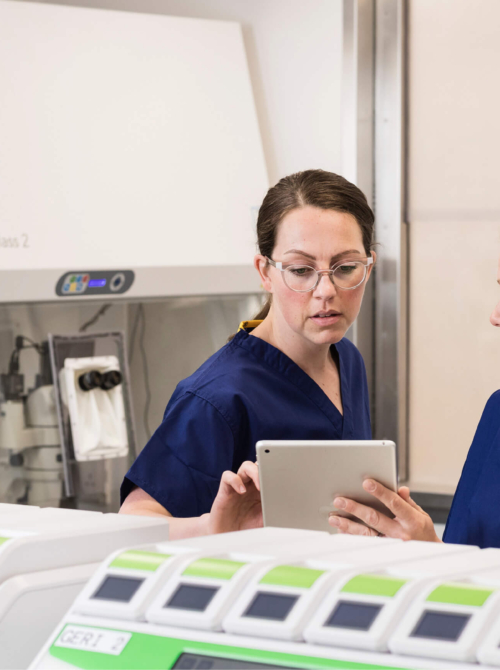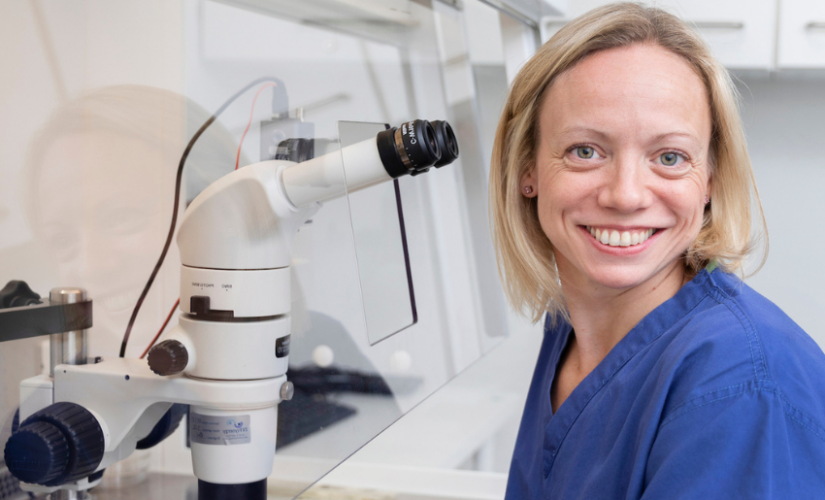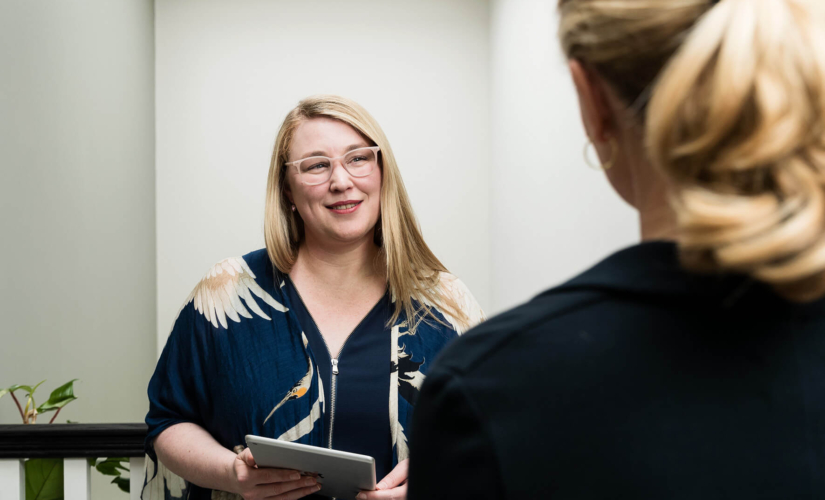Essential Questions to ask in an IVF Consultation
The questions you ask in the first few meetings with a fertility clinic can help you decide whether you feel comfortable to proceed – or not.
Emma the Embryologist explains the essential questions to ask in an IVF consultation.
The essential questions to ask during your IVF consultation
The questions you ask in the first few meetings with a fertility clinic can help you decide whether you feel comfortable to proceed – or not. Emma Whitney, The Evewell Head of Embryology and Genetics (aka @emmatheembryologist on Instagram) has written a blog on the essential questions to ask during your IVF consultation, so you get all the information you need before committing to treatment.
This article also features on Emma’s new website, which can be found here.
“I’ve done a lot of podcasts, webinars and Instagram Lives recently, and the one common theme is that patients don’t know what to ask in their first consultation with a doctor.
The questions you ask in the first few meetings with a fertility clinic can help you decide whether you feel comfortable to proceed with the information you have been given. You’re going to spend a long time in this clinic, so it’s important you feel supported and informed.
So here is my list of honest, unfiltered questions that, not only do you need to know the answer to, but a list of questions that you should be free to ask and should receive reasonable and honest answers to allow you to feel informed.
1. Will you treat me?
This is the most important starting question.
- “Considering my circumstances: my AMH, my age, and my context, will you offer me the treatment I need/want to have?”
Can the clinic support your medical context? I.e. do they offer the right level of anaesthetic support or certain embryo genetic testing? Some clinics won’t treat you if your BMI is above a certain level, or your AMH is below a certain number…. or if your egg collection numbers look low. It affects their success rates too much! A hard truth.
2. What are your success rates?
Clinics choose which success rates to publish. Some publish their success rates on pregnancy rates and some on live births per embryo transferred.
But before we go on, we need to clarify something.
- Pregnancy rates = a positive pregnancy test (not necessarily a live birth)
- Live births per embryo transferred = numbers of babies born for every embryo transferred (not per embryo transfer event – as there may be multiple embryos transferred at a time) – see my point below *
These two success rates can’t be compared apples to apples, therefore you can’t compare clinics if they report differently.
Pregnancy rates and babies born are both important measures of success, however, the chances of creating embryos to be transferred is more important, as without this you don’t fall into the published statistics.
A good question to ask is:
- How many patients do not have embryos to transfer when having treatment?
* Be mindful of clinics that cherrypick the results they choose to show you. Remember you went there for a baby, not a pregnancy. They are not the same thing!
3. What is your multiple birth rate?
There are many potential medical complications that come with multiple pregnancies, for both mother and babies.
Multiple pregnancies are dangerous for both the mother and babies, as well as put a strain on the NHS when babies are born prematurely. The risks are 10x compared to a singleton pregnancy.
Before your consultation, look at the clinic’s multiple birth rate. A multiple birth rate above 4% is worrying. Rates above 8% raise big red flags!
Good questions to ask are:
- Why is your multiple birth rate so high?
- How many embryos would you put back inside me?
- And then challenge them on why, if they suggest two or more.
4. Do you run a 7-day service?
Your treatment should not be affected by the work patterns of the clinic staff. The human body does not have an in-built calendar and embryos do not know it’s the weekend or a bank holiday.
If you are told you can’t have a blastocyst stage transfer at the clinic because it falls on a Sunday then the clinic shouldn’t be offering blastocyst culture, at all.
Equally, if you go to a clinic for a particular treatment e.g. PGT-A, this plan can’t be changed because the biopsy falls on the weekend — that’s not your fault.
5. How is the embryology team set up?
- What technology do you have in the lab? What do you do with atypically fertilised embryos, 1PN’s, 2.1PN’s, OPN’s?
- Do you have timelapse and can you see the embryos developing?
- How do you choose which embryos to transfer?
- How do they know if they are normal or not?
- How experienced are the lab team?
- Are the lab team available to speak with?
The embryology team play a huge part in the success of your treatment — you should be able to know more about them.
Unique to The Evewell, every single patient gets an embryology consultation before they start treatment, allowing them to have time to ask all these questions and fully understand each different stage.
6. How much will it cost?
This has to be outlined from the beginning. Everything you are going to need to pay for should be shown to you, before you start treatment. There shouldn’t be any nasty surprises (IVF is stressful enough!)
This includes if you need to have a “freeze all” embryo collection cycle, and a follow-up frozen transfer, typically not included in an IVF cycle.
7. How long will it take?
If this is something you’ve been gearing up for some time, you need to understand the timelines of IVF, how it fits into your life and how you can juggle work and life around your treatment.
- What does the timeline look like? Is there a waiting list?
- What stimulation protocol will I be put on: long or short? and why?
- How will this impact my work schedule?
- How can your clinic reduce disruptions for me?
- Are early appointments an option?
We’ve written a blog about How to Prepare for IVF and IVF, Step by Step to help prepare our patients.
8. What do we need to do before we start?
Before you start treatment, you want to do whatever you can to give yourself the best possible chance of success. And I mean both immediately, and in the long term.
Some questions to ask in this situation are:
- What investigations do both myself and my partner (if appropriate) need, before starting treatment?
- If there is a male partner, will he be properly evaluated?
A semen analysis isn’t always enough. Has there been recurrent miscarriage? Has this been checked appropriately?
- How will you take into account our aspirations for having a family?
- How do you connect this to the treatment advice?
- What standard tests do I need to have before?
- Can I have them elsewhere and do any of them expire?
9. What if I want more than one child?
Depending on your age, if you want more than one child, you may want to consider banking embryos before your first embryo transfer, so you don’t come back in a few years and have to start the whole process again.
This is what I refer to as ‘family planning’.
Ask:
- I know I want more than one child. Would you recommend multiple egg collections and embryo banking, so I have options for future children?
- Do I need to think about PGT-A to make sure we know the embryos frozen, will give us the best possible chance in the future of completing our family.
You may be just thinking “I’m desperate to just get pregnant and have a baby”, but I can’t tell you the amount of times I’ve had women and couples come back to me, this time in their early 40s, desperate for a second baby and by that time, it’s so much harder for them to secure a sibling for their child.
10. What support do you offer?
Not all clinics are created equally. Think about what is important to you when going through treatment.
- How do you consider my/our needs?
- Will the nurses be available for injection teaching or are we expected to watch a YouTube video?
- I’m scared of needles, how will this be respected and supported?
- I/my partner has a religious need that needs to be considered.
- I have a medical condition, will I need extra anaesthetic support?
- Is there an emergency number if required?
- What counselling support do you have and how do you tell me/us how to access it?
- How will you ensure I am listened to?
11. What can I do to increase my/our chances?
The process of IVF treatment should be a collaborative effort between the patient, the consultant, the embryology team and other lifestyle and holistic considerations.
Basically: there are things you can do to help improve the outcome, and better still: feel more in control.
Recommended questions to ask your consultant, before starting IVF, are:
- Can you recommend any holistic therapists that may help my outcome? (eg: acupuncturists, nutritionists)
- Are there any lifestyle changes you’d recommend, or supplements that I/we should be taking?
- Is there a potential situation where there needs to be a pause and delay before I/we start?
It shouldn’t all be go go go, sometimes you need to pause, take a moment and think about what you can do to help give yourself the best possible chance of success.
The take-home message here is never do anything that makes you feel unheard, without seeking a second opinion. Just because one clinic can’t or won’t offer you treatment with your own eggs and sperm does not universally mean that you have to move to a donor option. If that’s not what you want to do, seek advice.
If you’re already on your IVF journey, or you’ve completed your family, please share with people about to start IVF, or returning for more treatment; we’re stronger together and all of our experiences will help each other become better informed and less anxious.”





